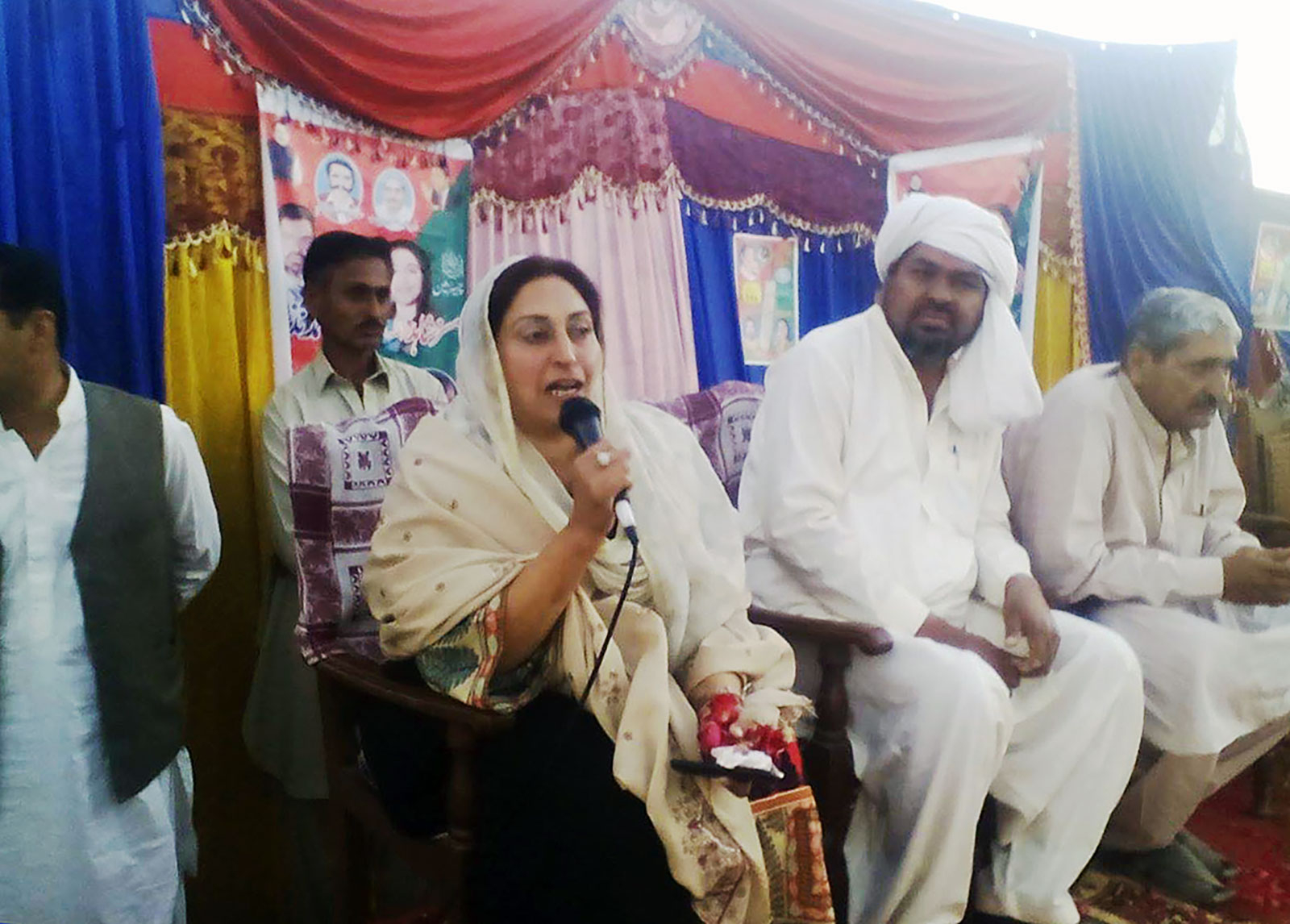
Shahida Malka Ahmed speaks at a campaign event
Shahida Malka Ahmed was elected on November 19, 2015 as a union council chair in Khanewal District as part of the newly established local government system in Punjab, Pakistan’s largest province. Shahida’s victory stands out as fewer than 300 women competed for 50,000 directly elected seats in the 2015 local elections (and only 60 sought election as chair and vice chair). Women’s political participation was also low in Pakistan’s 2013 national elections as women represented less than three percent of all candidates for directly-elected general seats in national and provincial assemblies.
Local government elections in Punjab -- as in the rest of the country -- were long-awaited as previous local government systems were dissolved in 2010. Reinstated by a Supreme Court ruling in 2012, Pakistan’s four provincial governments prepared legislation, outlined new regulations and held elections between 2013 and 2015.
Newly elected councils in most of Punjab Province have two tiers, depending on the size of each district’s population. In rural areas (where Shahida now holds office), the two tiers include one council at the district level and another at the union council level (one district may contain several union councils). Shahida represents her constituents at both levels, as elected union council chairs also serve as members of the district council.
A successful athlete as a young adult, Shahida is originally from Lahore (Pakistan’s second-largest city), but moved to Khanewal District when she married in 1984. In this more conservative environment, there has traditionally been little room for women to lead or participate in civic and political life. As a housewife and mother of four children, however, Shahida developed a passion for the welfare of her community and began looking for avenues for civic engagement.
As early as 2001, she was appointed to her district’s Public Safety Commission and worked to oversee police performance, monitor human rights abuses and gender-based violence reported to the commission, and to resolve other local disputes. Experience serving as a public safety commissioner encouraged Shahida to pursue political work more explicitly as she then successfully sought indirect election to the Khanewal District Council in 2005, filling a seat reserved for women.
“Although I joined a political party later in my career, politics was always in my blood,” Shahida says.
Acknowledging Shahida’s previous work and determination to support her community, the Pakistan Tehreek-e-Insaaf (loosely translated as the Pakistan Movement for Justice and abbreviated as PTI) political party appointed her as member of a policy working group to develop informed party policies based on research and citizen involvement.
Shahida has since become a vocal and active member of the party, championing social welfare causes and working to better respond to citizen concerns. She has also been an advocate for recognition of political parties in the local government system, an attribute that was ultimately included as the new framework was finalized in 2015.
Increasing Women’s Participation, One Candidate at a Time
To increase women’s participation in political life, Pakistan implements gender quotas at all levels of government. In Punjab Province, roughly 15 percent of union council seats are reserved for women within the local government system. These reserved seats are indirectly elected. In advance of 2015 local elections, PTI nominated Shahida to fill one of the district council seats reserved for women.
Shahida turned down the party’s offer as she preferred to contest the directly elected position of union council chair. PTI leadership was initially hesitant to select her as candidate for union council chair office as rival political parties were nominating more experienced and potentially stronger candidates. After further discussion, however, Shahida convinced her party that she could obtain the popular support needed to defeat her rivals.
Khanewal District voters listen to candidates and consider who to support.
Despite being new to the male-dominated political landscape, Shahida’s persistence and active involvement in the community ultimately led to her successful election as union council chair. Holding corner meetings, conducting door-to-door citizen outreach, leveraging her Facebook campaign page, distributing posters and pamphlets, and reaching out to media allowed her to effectively engage citizens and obtain more votes than her rivals.
One asset for Shahida and members of all mainstream Pakistani political parties in recent years has been the training provided by NDI. These workshops and consultations provide women candidates from across the political spectrum with access to best practices on campaign messaging, citizen outreach, social media, fundraising and campaign management.
I learned all of these things from the NDI program. In mock exercises, NDI taught us how to mobilize social capital in support of a campaign. I used those skills practically and achieved results, Shahida says.
Through a program funded by the United States Agency for International Development (USAID), NDI provided training to district-level political party members from ten major political parties in Pakistan from 2011 to 2016 on how to more effectively communicate party policy proposals internally and externally. These ten parties, which are represented in the national and provincial assemblies, include: Awami National Party, Jamiat Ulema-e-Islam Fazul, Muttahida Qaumi Movement, National Party, Pakistan People’s Party, Pakistan Muslim League-Functional, Pakistan Muslim League-Nawaz, Pakistan Muslim League Quaid-e-Azam, Pakistan Tehreek-e-Insaf and Qaumi Watan Party.




